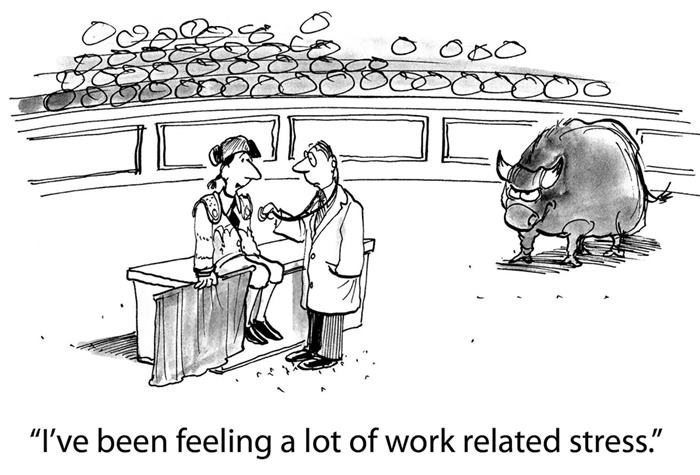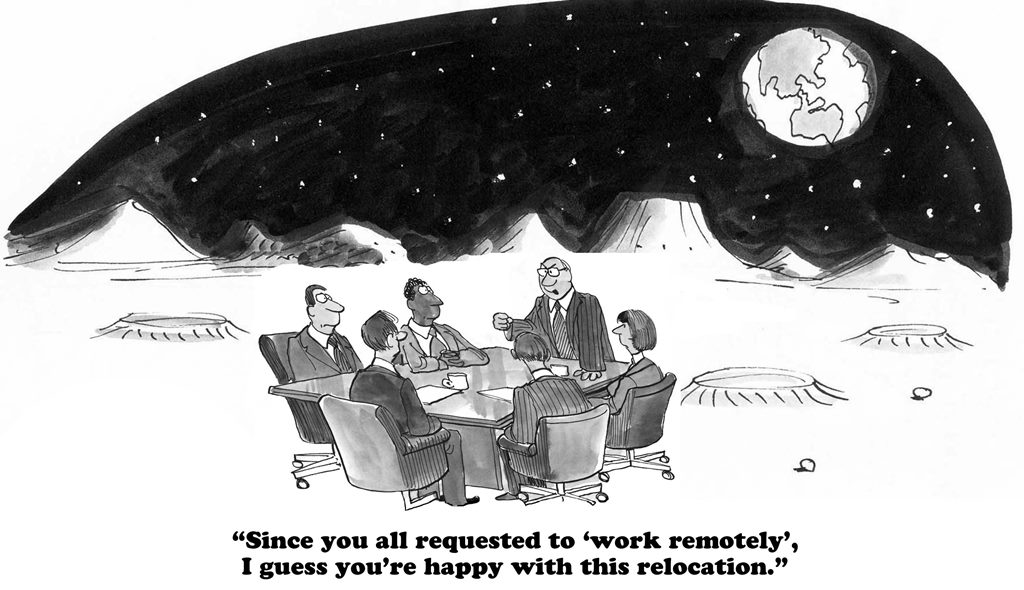Positives and Negatives
While there are many positives, some people find it hard to adapt to home and remote working. Being unable to physically meet people can lead to frustration and insecurities and give rise to fears that the social element of work will be gone or considerably diminished. Feelings of isolation and stress are not uncommon in remote workers. So, if you’re offered a remote job, it’s important to go into remote working with open eyes, acknowledge the potential issues and deploy strategies to lessen any negative impacts. This is our assessment of the pros and cons of remote working.
Flexibility
There are a number of pitfalls that you need to be aware of before embarking on a journey into remote working, but without doubt there are some real advantages for individuals.
Flexibility is an important one, particularly for parents who can find it a lot easier to balance career with child care and spend more time with their kids. There was something special about being able to pick my kids up from school when they were young, but sadly having to commute for an hour each way into work meant I was rarely able to do this. So working from home may well provide you with the chance to build a better relationship with your family and potentially reduce child care costs. Even without children, the opportunity to follow a less regimented life than one that consists of commute, work and commute again appeals to a lot of people.
Flexibility isn’t just about family it’s also about structuring your day the way you want to. If you want to take the morning off and work late then there’s no funny looks to contend when you roll into the office in the afternoon. Maybe you want to have a quick nap after lunch (just try that in the office!) or watch a film in the morning. It’s all possible when you’re working from home.
A lot of people thrive in an environment where there’s less scrutiny. Less pressure and freedom from feeling that the boss is breathing down your collar ironically boosts productivity with many employees.
Losing the commute
Waving goodbye to commuting is usually quoted as the major attraction for remote workers and most of us can easily appreciate the allure of this. Commuting either by car or public transport can be unpleasant and frustrating, not to mention expensive.
Cheaper housing
There is a certain irony that the types of roles most likely to be conducive to remote working are predominantly based in cities e.g. Finance, Marketing and IT, as are the people who fill those roles. Accommodation in big cities is usually pricey and so tight for space that it doesn’t rate as the ideal home-working environment.
However, those employees or contractors who know they can reliably work from home should be able to locate themselves in lower cost, more spacious and almost certainly more pleasant accommodation out of town. Working remotely has the potential to give you the best of both worlds, access to the big city and all of the opportunities that brings for both work and entertainment while living a better lifestyle in a less crowded and less polluted environment outside of town. I know an IT developer who works remotely and lives five minutes from a beach with his young family. His prime motivation is to bring his children up in a pleasant environment close to good schools. The only real limitation on where he can live is the quality of the internet connection.
Fewer distractions
Many people find they can be far more productive in a remote environment. The lack of the type of distractions encountered in an office helps concentration and there is potential to structure your day to maximize productivity. I worked with a client on the East Coast of the States. Because of the time difference this allowed me to reserve my mornings for uninterrupted desk work and the afternoons for meetings, but with a little discipline you can achieve this sort of split wherever your customers are.
You’ll be richer
You’ll almost certainly be richer too. Commuting costs money, so does that wardrobe of smart work clothes and the packaged sandwiches and barista coffee you just can’t resist. Having said that you may need to work hard on your willpower with the fridge and cookie tin only a few paces away!
So if you like the sound of the pros, before you get too excited, let’s take a look at the cons of remote working.
Isolation, loneliness and stress

This may sound a bit alarmist but these are factors you need to consider if you’re working from home.
The lack of the sort of support organisation you’d expect to have around you in an office based set up can quickly lead to feelings of isolation. Hopefully you’ll be working for an enlightened company who have thought out how to get remote workers up to speed and provide a good induction programme but the chances are this won’t be the case. Not knowing what you have to do, who you need to ask and where to find information can be both frustrating and stressful. It’s also very easy for office based management to fall into an ‘out of sight out of mind’ mentality with remote workers and this can lead to feelings of being left out and lack of trust.
From my experience of working remotely, I’ve found it’s easy to slip into feelings of uncertainty about what value you’re adding. I’ve found myself thinking that doing my job well wasn’t enough and feeling pressure to be seen to be always making an impact. My way of compensating for that was to work harder, to try to do a better job than I ever would have face-to-face. In most work situations our performance is rated against our peers. One of the issues with remote work is that often there is no clear benchmark, making it much harder to measure your effectiveness against others doing similar jobs. These and similar behaviors are easy to fall into as a remote worker and can result in overwork, anxiety and stress. Most of the surveys carried out during and after the COVID-19 pandemic indicated that remote workers suffer a higher level of stress associated with burnout, isolation and meeting overload.
Boundaries between work and leisure have a tendency to blur. With the commute gone and the work computer in the next room there’s a strong temptation to keep working or to squeeze a couple of hours of work in before bedtime or at the weekend, particularly if you’re up against a deadline. This is exacerbated further if you’re working on an international project when you may be called into meetings late at night for you but midday for everyone else. One of the projects I worked on involved a meeting that included European, Middle and Far Eastern and an Australian attendee. The Australian attendee always used to joke that he was attending in his pyjamas, because of the time differences. All of this can take a toll on sleep patterns and mental health.
Loneliness is also an acknowledged issue for home workers and tends to be exacerbated by long and potentially anti-social hours. The Epson Ecotank Survey of 1000 freelancers found that while there were plenty of positives expressed for working from home, 48% of those interviewed said they had experienced loneliness and 46% said that it was isolating. In addition 29% said they missed being part of a team and 32% missed the social aspects of being in an office. For many people, particularly those in repetitive jobs, a large part of their job satisfaction comes from meeting people and social interaction.
How to make sure you enjoy remote working
So in considering the pros and cons of remote working, it’s important before you commit to an extended spell of remote work that you appreciate these dangers. There are some simple and sensible things you can do to lessen their impact and help you enjoy working remotely:-
- Be kind to yourself, acknowledge that remote working can be stressful and don’t beat yourself up if things go wrong
- Work on your social life. Make sure your social life outside of work is as good as you can make it. Get out of the house, meet people, do things, have fun!
- Take part in remote social activities with your team – hopefully this is something that your employer helps organise.
- Stay fit. Fitness is important and if you pick the right sport, also a social outlet. I play a lot of tennis and try to make sure I fit my work schedule around my tennis life when I’m working remotely. Exercise relaxes you and boosts endorphins and is a real antidote to being stuck at home all day working. A long walk, a run or a bike ride is good.
- Look after your body. Maybe fitness is a step too far if you’re not an active sort of person, but be aware what hours slumped over a laptop can do to your body. This applies to office work too, but in the quieter, more absorbed atmosphere of remote work, it’s a lot easier to just obsessively plough on. Staying seated at a desk for hours on end can give you back and neck ache and generally screw your body up. Getting up and walking around frequently is good advice. A study from Columbia University recommended getting up from your desk every 30 minutes. They found that switching out 30 minutes of sedentary time over the course of the day for 30 minutes of low-intensity activity reduced the risk of an early death by about 17%. You might also want to look at Yoga or Pilates as a way of stretching the wrinkles out of your body. What you put into your body also counts, drink plenty of water and if working at home makes you snack more then buy in some healthy snacks rather than loading up on fat, sugar and salt.
- Look after your mind. Bill Gates and Paul McCartney are two amongst many who meditate every morning and swear by its benefits. Twenty minutes meditation before throwing yourself into your day’s work starts you off feeling calm and clear minded and provides a break between home life and work life. It’s too easy when you’re working remotely to wake up with your head full of thoughts about work, rush through breakfast and just get stuck into it. Think of it as replacing your highly stressful commute with some moments of calm and inner peace. I’d highly recommend Quiet The Mind by Matthew Johnstone as a short and amusing way of learning how to meditate.
- Be aware of ‘Zoom Fatigue’. From research carried out by Gianpiero Petriglieri, and Marissa Shuffler you’re more likely to experience fatigue on videoconferences because the brain has to work a lot harder. Petriglieri observes that not only is it much harder to relax into conversation naturally but we’re also constantly trying to try to find the non-verbal content that we usually just absorb without having to think about it. Our minds are together but our bodies are not. Shuffler points out that seeing yourself and also seeing everyone apparently staring at you when you talk can also make you feel like you’re constantly performing and that can be exhausting too. Their remedy is to avoid loading yourself with back-to-back video meetings and try turning the camera off if you feel too observed.
- Make use of the flexibility. Working from home gives you flexibility, so take advantage of this. Give yourself a lunch-break, go for a walk, watch some TV or maybe part of a film each day or enroll in a daytime class where you can switch off and meet people. Make sure you’re not tied to a desk all day every day for hours on end. It’s not good for your physical or mental well-being.
- Make a daily schedule. While the flexibility you get is great it’s also good to have a structure to your day and to your week. Take time at the start of the day and start of the week to organise how you’re going to utilise your time.
- Follow a plan and/or to do list. I’ve found myself at the end of days, weeks or even months trying to work out just what I’ve achieved. Clearly this can be the case for office work too, but you seem to feel it more when you’re working remotely. Set yourself targets and give yourself a mini pat on the back when you achieve them.
- Be organised. If you’re going to prove your professional credibility you need to be organised. Make sure you have the facts at your fingertips. Do your homework and understand what is going on. If there are gaps in your knowledge then try hard to fill them. If you’re working in an unfamiliar technical area, carry out your own research to get up to speed.
- You might want to consider working in a shared physical space to increase your opportunities for social interaction. This could be a coffee shop with Wi-Fi (as long as security isn’t compromised) or one of the many co-working spaces that are springing up aimed mainly at one person businesses. Check out a Jelly – where you’ll find a directory and on Meetups. The concept is to get remote workers together to work and collaborate (but not feel pressured to sell) in a shared place at no cost to the user.
- Know when to stop work. One of the biggest issues with home workers is that they don’t know when to stop and can end up working long days and weekends, risking stress and burnout.
- Reduce the unnecessary distractions. Distraction and lack of concentration can be an issue for remote workers. This isn’t just about getting today’s work done, it can also place a strain on you and make you doubt your ability to finish things. Put some rules in place e.g. no news, sports and social media sites until your lunch break or the end of your working day. Use the ‘Do Not Disturb’ setting on your smartphone with exceptions so you can still receive calls but delay the noise from social media and messaging until you’re ready to accept it.
- Try to adapt to different time zones. If you’re working on an international project think about how you’re going to organise your day. If you’re in Europe and working with people on say the west coast of America then think about matching their hours or at least extend the overlap between your hours and theirs.
- Get enough sleep. Just because the office is so close to your bed it doesn’t make it a good idea to go straight from the one to the other! Give yourself a decent gap between work and going to bed. The overstimulation associated both with work and staring at screens close to bed time is likely to result in disturbed sleep. You may also want to take advantage of the flexibility of remote work by taking a nap during the day – it’s amazing how much this can recharge your batteries, but make sure you set an alarm if you do. “Sorry I missed your important meeting because I fell asleep” really isn’t a good line.
Your home office

If you’re going to make remote working work for you then you need to have a decent home office. It may initially seem ok to work from the kitchen table but for a whole host of reasons that’s likely to become difficult to sustain. Working with any set-up where the screen isn’t at eye level is highly likely to result in neck, shoulder and back pain and if continued can cause permanent damage to your health.
There will be times where you’ll need privacy or to demonstrate it to the other people on the call. Other members of your family wandering in and out of shot won’t exactly help.
The best environment is one where you can cut yourself off mentally and physically from your home life. As well as providing privacy, this also achieves a level of separation that helps discourage you from merging home and work life. If you don’t have this then you should think hard about whether you can make remote working work for you long term.
Once you have your home office you need to be able to set yourself up to facilitate working from home. A decent wide desk so you can have everything you need in front of you, an ergonomic chair with plenty of adjustment to give you proper back and neck support.
Ideally you want a wireless mouse and keyboard and a monitor that you can have at head level – the top third of the screen should be at eye level, the keyboard and mouse at elbow height with your back straight, not hunched over the screen.
You’ll probably be spending a good proportion of your working life videoconferencing. Wearing a headset for hours on end can be very tiring and starts to heat your head up. There are lightweight headsets which are better but the set up I prefer is a high quality webcam with a good microphone and the sort of lightweight headphones you’d use for listening to music. There are plenty of good webcams out there and lots of video reviews on YouTube but I’d personally recommend a midrange Logitech or Microsoft webcam. You generally get what you pay for and the cheaper webcams either have poor microphones or poor cameras or both!
Try to make your home office as pleasant and light an environment as possible within the constraints of what’s you can do in your home. If you’re going to spend all or most of your working life in your home office then you’d better like being there!
Self-esteem and morale
There are aspects of remote working that can start to gnaw away at your feelings of self-esteem. For instance, meetings can be a very different experience. Often one or a few people can dominate a meeting and it can be very hard to break in and get across what you need to. At the other end of the scale, it’s also easy to find someone talking over you. Videoconferencing doesn’t lend itself well to working out when you can break in or to warding people off who are trying to talk over you. It’s much easier to sense the time to either interrupt or to not break in from people’s body language in face-to-face meetings. Sometimes video calls can dissolve into a cacophony of noise as several people try to break in at the same time while someone is already speaking. This can be both frustrating and morale draining, but it’s important to see this as limitations of the technology and the general situation and not let it get you down.
When you do speak at meetings it can feel a bit scary, given you’re always addressing the entire meeting. This tends to be further exacerbated by a screen full of faces staring at you, none of whom seems to be reacting to what you’re saying. This can be unnerving and sag your morale and some people find it difficult. One way of addressing this is that many videoconferencing packages allow you to split a meeting into smaller break-out groups and then come back together towards the end of the meeting. Often this can be better than all sitting together with some people listening and not contributing for a good part of the meeting. Suggest this to the person who called the meeting if you think this would work better for you.
Think about how you want to appear to the other participants in the videoconference. You see yourself on the screen in videoconferences and it’s very easy to start thinking what an unkempt wreck you look and how the camera seems to be exaggerating all of your wrinkles and making you look older than you are. Just because you can roll out of bed straight into your office there’s no reason to look like that just happened. You may want to dress smartly and fix your hair and face, plus very importantly sort out the lighting in your office. Most people look pretty ghastly when lit from the side. Face-on lighting makes you look a whole lot better and has a tendency to mask your imperfections (assuming you have any!). Also aim to have the camera at eye level. Below doesn’t really work unless you like the Bohemian Rhapsody effect and above doesn’t tend to present the best image of you either. If the camera is on top of the screen and hard to move, this may mean you moving instead by changing your chair adjustment during videoconferences. This may all sound a bit facile but don’t underestimate it. If you look good then you feel good and when you’re working remotely, it’s important to keep your moral high.
Conclusion
Know what you’re letting yourself in for remote work and you’ll find the added flexibility and control over your life plus the being better able to balance work and home life will enhance your life. Spiral down into a pit of isolation and burnout and the reverse is true. Hopefully reading this article on the pros and cons of remote working will help you get it right.
Gren Gale is a consultant in Remote Work and Project Management and has been named as one of the top 19 Key Opinion Leaders globally in remote work in Who’s Who in Remote Working? as an influencer in Who’s Who in The Future of Work? and one of top 50 Project Management Leaders internationally by Leaders Hum. He is author of the Remote Project Manager and Remote Work The New Normal.

Enjoyed this article on the pros and cons of remote working. See our blog for more articles on both remote work and project management and our product reviews
This review of the pros and cons of remote working was written from an unbiased viewpoint. Once written we look to see if some of the links can generate affiliate income. It won’t make us rich but it helps pay the rent! All cartoon images – Cartoon Resource Shutterstock



Recent Comments